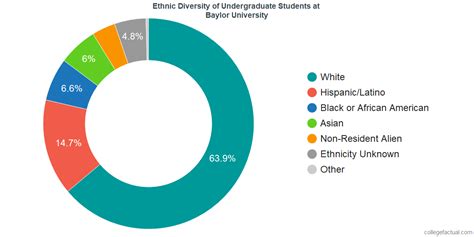Introduction
Baylor University, a private Christian university in Waco, Texas, is renowned for its academic excellence and vibrant campus life. With a rich history spanning over 150 years, Baylor University is home to a diverse student body representing various cultural, socioeconomic, and ethnic backgrounds. Understanding the demographics of Baylor University provides valuable insights into the composition and characteristics of its student population.

Undergraduate Student Demographics
As of Fall 2021, Baylor University enrolled 20,616 undergraduate students. The undergraduate student body comprises:
- Gender: 56% female, 44% male
-
Race/Ethnicity:
- 61.6% White
- 18.5% Hispanic/Latino
- 10.4% Black/African American
- 3.7% Asian/Pacific Islander
- 1.8% Native American
- 4.0% Other
Graduate Student Demographics
Baylor University’s graduate programs offer a wide range of academic disciplines. The university enrolled 5,398 graduate students in Fall 2021. The graduate student body consists of:
- Gender: 57% female, 43% male
-
Race/Ethnicity:
- 64.7% White
- 14.8% Hispanic/Latino
- 9.1% Black/African American
- 4.9% Asian/Pacific Islander
- 1.5% Native American
- 5.0% Other
International Student Demographics
Baylor University fosters a global campus environment, attracting students from around the world. In Fall 2021, 1,754 international students were enrolled at the university:
-
Top Countries of Origin:
- China (31.1%)
- India (8.9%)
- Mexico (7.2%)
- Saudi Arabia (6.9%)
- South Korea (4.1%)
Faculty Demographics
Baylor University employs a highly accomplished faculty of professors, researchers, and lecturers. As of Fall 2021, the university had 1,766 full-time faculty members. The faculty demographics include:
- Gender: 44% female, 56% male
-
Race/Ethnicity:
- 78.2% White
- 10.4% Hispanic/Latino
- 6.2% Black/African American
- 2.7% Asian/Pacific Islander
- 0.5% Native American
- 2.0% Other
Student Socioeconomic Demographics
Baylor University is committed to providing access to higher education for students from diverse socioeconomic backgrounds. The university offers various financial assistance programs, including scholarships, grants, and loans.
-
Family Income:
- 43% of students come from families with incomes below $100,000.
- 37% of students come from families with incomes between $100,000 and $200,000.
- 20% of students come from families with incomes over $200,000.
-
Parental Education:
- 52% of students have at least one parent with a college degree.
- 32% of students have both parents with college degrees.
- 16% of students have parents without a college degree.
Student Life and Extracurricular Activities
Baylor University offers a vibrant and engaging campus life. The university supports numerous student organizations, athletic teams, and extracurricular activities.
- Student Organizations: Over 400 student organizations, including academic clubs, religious groups, and service-oriented organizations.
- Athletic Teams: 19 varsity sports teams compete in the Big 12 Conference.
- Extracurricular Activities: Baylor University offers various recreational facilities, events, and programs.
Conclusion
Baylor University’s diverse and vibrant student body enriches the campus experience and prepares students for success in their personal, professional, and global endeavors. The university’s commitment to academic excellence and inclusivity is reflected in its demographics, which showcase a wide range of backgrounds, perspectives, and experiences.
Additional Tables:
| Category | Percentage | Number |
|---|---|---|
| Undergraduate Students | 79.1% | 20,616 |
| Graduate Students | 20.9% | 5,398 |
| International Students | 6.7% | 1,754 |
| Full-Time Faculty | 100% | 1,766 |
Sources:
– Baylor University Factbook: https://www.baylor.edu/content/services/document.php/283760.pdf
– National Center for Education Statistics: https://nces.ed.gov/collegenavigator/
